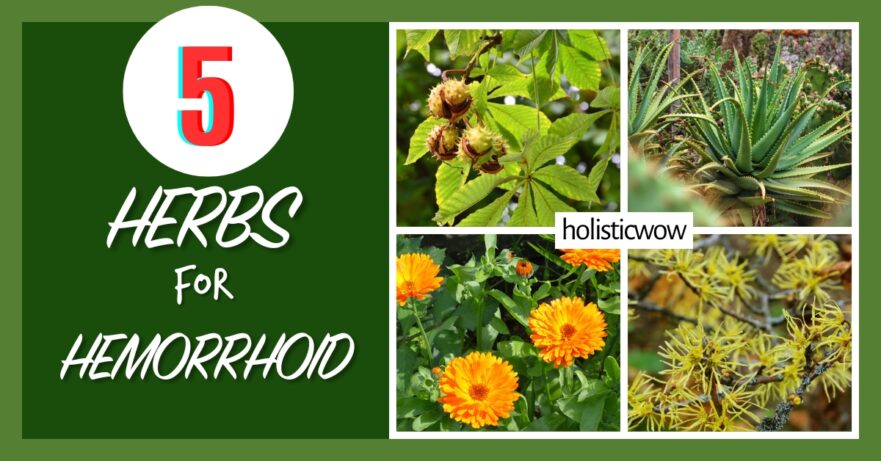In this article about herbs for hemorrhoid:
🌿 Best Herbs for Hemorrhoid Relief | 📜 Herbal Preparations and Recipes for Hemorrhoid Relief | ☯️ Integrating Herbs into Daily Life for Hemorrhoid Relief | 🌱 Navigating Herbs Safely
Hemorrhoids are swollen blood vessels in the anal area that can cause pain, itching, and bleeding. This condition often results from straining during bowel movements, prolonged sitting, or pregnancy. Symptoms can range from mild discomfort to severe pain, affecting daily activities.
Herbs like horse chestnut, witch hazel, and aloe vera offer natural relief for hemorrhoid symptoms. These plants contain compounds that reduce inflammation, strengthen blood vessels, and promote healing. They can be applied topically or taken orally for effective symptom management.
This article will explore the benefits of these herbs for hemorrhoid relief. We’ll discuss how to use them safely and effectively, helping you make informed decisions about incorporating herbal remedies into your hemorrhoid treatment plan.
Key Takeaways
- 🌼 Effective herbal options: Horse chestnut, witch hazel, aloe vera, calendula, and chamomile offer natural relief for hemorrhoid symptoms.
- ✨ Anti-inflammatory properties: These herbs contain anti-inflammatory compounds that reduce swelling, support blood vessel health, and promote healing of affected tissues.
- 📍 Topical application benefits: Topical application of these herbs provides immediate soothing and relief of hemorrhoid discomfort.
- 🌿 Herbal preparation variety: Compresses, ointments, sitz baths, and salves offer versatile options for using these herbs to treat hemorrhoids.
- 🥗 Lifestyle integration importance: Combining herbal remedies with a high-fiber diet, proper hydration, and good hygiene enhances their effectiveness in managing hemorrhoids.
🌿 Best Herbs for Hemorrhoid Relief
Hemorrhoids are a common and often uncomfortable condition affecting the anal area. These swollen blood vessels can cause pain, itching, and bleeding during bowel movements. Several herbs have been traditionally used for relief, including horse chestnut (Aesculus hippocastanum), witch hazel (Hamamelis virginiana), aloe vera (Aloe barbadensis), calendula (Calendula officinalis), and chamomile (Matricaria recutita). Research suggests these herbs may provide anti-inflammatory, astringent, and soothing effects, alleviating some of the symptoms associated with hemorrhoids.
Hemorrhoids typically develop when there’s increased pressure in the lower rectum, often due to straining during bowel movements, prolonged sitting, or pregnancy. Common symptoms include pain, itching, and swelling around the anus. You may notice bright red blood on toilet paper or in the toilet bowl after a bowel movement, which indicates hemorrhoidal bleeding. External hemorrhoids can be felt as small, painful lumps near the anus, while internal hemorrhoids may prolapse or protrude through the anus.
Factors that can contribute to hemorrhoid development include chronic constipation or diarrhea, a low-fiber diet, obesity, and a sedentary lifestyle. Understanding these causes and recognizing the symptoms early can help manage the condition effectively and prevent it from worsening.
Horse chestnut (Aesculus hippocastanum)
Horse chestnut (Aesculus hippocastanum) has been used for centuries to treat circulatory issues, including hemorrhoids. The active compound in its seeds, aescin, has anti-inflammatory and vein-strengthening properties, effectively reducing hemorrhoid symptoms like pain, itching, and swelling. Horse chestnut improves blood flow, reduces fluid retention, and tones blood vessels, which can relieve hemorrhoidal discomfort. Several studies support the use of horse chestnuts to improve venous tone, which is crucial in both hemorrhoids and varicose veins. It can be taken orally or applied topically to help manage hemorrhoid symptoms.
Witch hazel (Hamamelis virginiana)
Witch hazel (Hamamelis virginiana) is a popular natural remedy traditionally used for hemorrhoids due to its astringent properties. The tannins and oils in its bark and leaves help shrink swollen tissue and reduce minor bleeding, making it a common ingredient in over-the-counter hemorrhoid treatments. When applied topically, witch hazel relieves itching and burning associated with hemorrhoids. Its natural cooling effect can soothe external hemorrhoids, and it helps clean the affected area while reducing mild inflammation. Witch hazel may not be as potent as some medical treatments, but it is commonly used to complement them. Its versatility makes it available in liquids, wipes, and suppositories. Witch hazel is generally well tolerated. Studies indicate it has a good safety profile, even when used in suppositories, and shows no significant side effects when used rectally (Qinna, 2013).
Aloe vera (Aloe barbadensis)
Aloe vera (Aloe barbadensis) is well-known for its soothing and healing properties, making it a potential natural remedy for hemorrhoids. The gel from aloe vera leaves contains anti-inflammatory, analgesic, and wound-healing compounds. When applied topically, aloe can help reduce pain, itching, and inflammation associated with hemorrhoids. It also forms a protective layer over the affected area, promoting faster healing. A randomized, placebo-controlled trial found that aloe vera cream significantly reduced post-hemorrhoidectomy pain and improved wound healing compared to a placebo. Another clinical trial demonstrated that aloe vera cream was effective in reducing chronic anal fissure pain, improving wound healing, and reducing bleeding. In addition to its topical use, aloe vera juice may help soften stools and reduce constipation, a common cause of hemorrhoids. However, using pure aloe vera gel without added preservatives or fragrances is important to avoid irritation.
Calendula (Calendula officinalis)
Calendula (Calendula officinalis) has been traditionally used for its wound-healing and anti-inflammatory properties, making it a potential natural treatment for hemorrhoids. The flowers contain compounds that help reduce inflammation, promote tissue repair, and have antimicrobial effects. When applied topically, calendula can soothe irritated skin, reduce swelling, and aid in healing hemorrhoids. Its gentle nature makes it suitable for the sensitive skin around the anal area. Calendula is available in ointments, creams, or suppositories and is commonly used for hemorrhoid relief. Studies suggest that calendula may improve wound healing by reducing inflammation and promoting the formation of granulation tissue during the healing process, particularly in acute wounds. However, more research is needed to confirm its effectiveness specifically for hemorrhoids.
Chamomile (Matricaria recutita)
Chamomile (Matricaria recutita) is a versatile herb known for its calming and anti-inflammatory properties, which are potentially beneficial for treating hemorrhoids. Chamomile flowers contain compounds like bisabolol and chamazulene, which have anti-inflammatory and mild antispasmodic effects. When used topically, chamomile can help soothe irritated skin, reduce swelling, and alleviate discomfort associated with hemorrhoids. Its gentle nature makes it suitable for sensitive skin in the anal area. Chamomile can be applied as a compress or used in sitz baths to relieve hemorrhoid symptoms. While research on chamomile’s direct impact on hemorrhoids is limited, studies support its wound-healing and anti-inflammatory properties in various skin conditions, suggesting potential benefits for hemorrhoid-related irritation and inflammation. However, more research is needed to confirm its specific efficacy in treating hemorrhoids.
📜 Herbal Preparations and Recipes for Hemorrhoid Relief
These herbal recipes blend traditional remedies with soothing, plant-based ingredients for those seeking natural relief from hemorrhoids. Each preparation aims to offer gentle support for managing discomfort, swelling, and irritation associated with hemorrhoids. From compresses to sitz baths, these options provide various potency levels, catering to different preferences and needs. However, it’s essential to keep in mind that while herbal remedies are often used for symptom relief, their effectiveness can vary, and results may differ from person to person. Always consult a healthcare provider before starting new treatments, especially for persistent or severe symptoms.
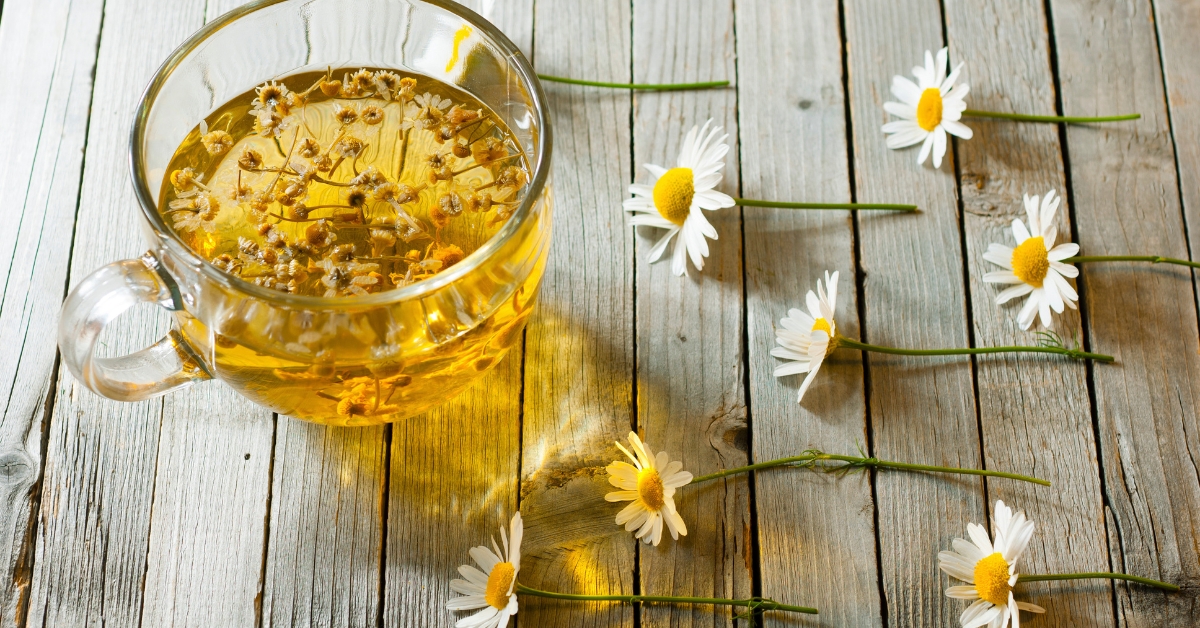
Soothing Witch Hazel Compress
Ingredients:
- 1 tablespoon dried witch hazel bark
- 1 tablespoon dried chamomile flowers
- 1 cup of boiling water
Preparation:
- Combine herbs in a heat-safe bowl.
- Pour boiling water over herbs and steep for 15 minutes.
- Strain and let cool slightly. Soak a clean cloth in the liquid and apply as a compress to the affected area for 10-15 minutes, 2-3 times daily.
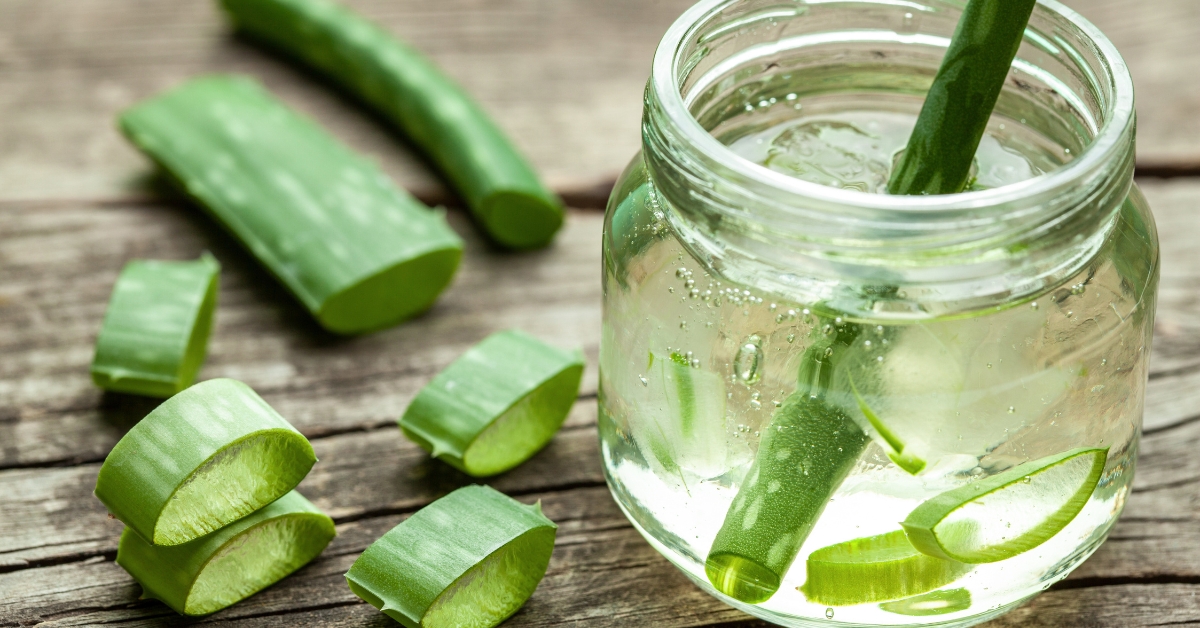
Calming Aloe-Calendula Gel
Ingredients:
- 2 tablespoons aloe vera gel
- 5 drops of calendula tincture
- 5 drops of chamomile essential oil
Preparation:
- Mix all ingredients thoroughly.
- Apply a small amount to the affected area 2-3 times daily after cleaning.
- Store in an airtight container in the refrigerator and use within 1 week.
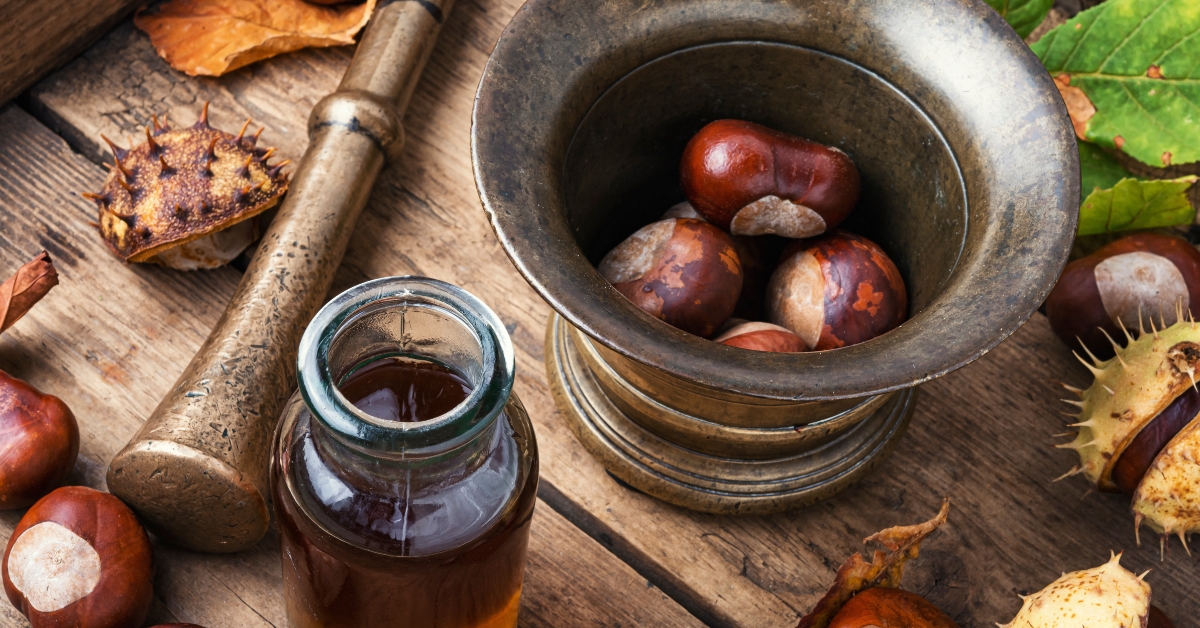
Horse Chestnut-Witch Hazel Ointment
Ingredients:
- ¼ tablespoon horse chestnut tincture
- ¼ tablespoon witch hazel extract
- 1 tablespoon aloe vera gel
- 2 tablespoons unscented base cream
Preparation:
- Mix all ingredients until well combined.
- Apply a small amount to the affected area 2-3 times daily.
- Store in an airtight container in the refrigerator and use within 1 week.
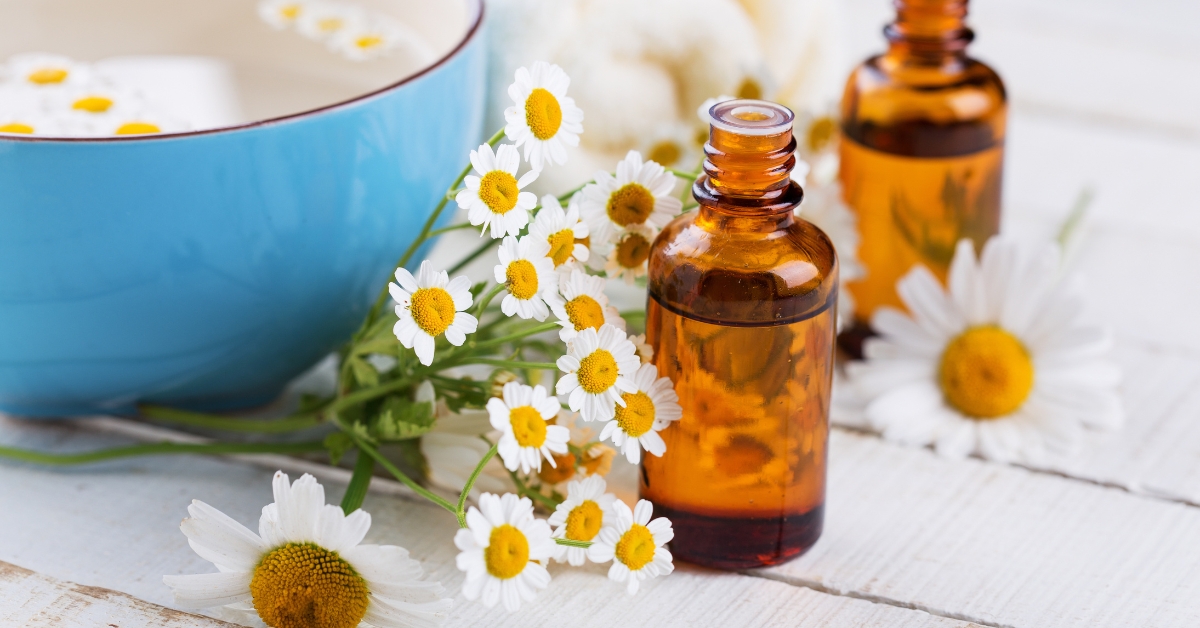
Healing Herbal Sitz Bath
Ingredients:
- 1 tablespoon dried calendula flowers
- 1 tablespoon dried horse chestnut flowers
- 2 tablespoons dried witch hazel bark
- 2 tablespoons dried chamomile flowers
- 4 cups of boiling water
Preparation:
- Mix all herbs in a large bowl.
- Pour boiling water over herbs and steep for 20 minutes.
- Strain and add to a sitz bath or shallow bath. Soak the affected area for 15-20 minutes, once or twice daily.
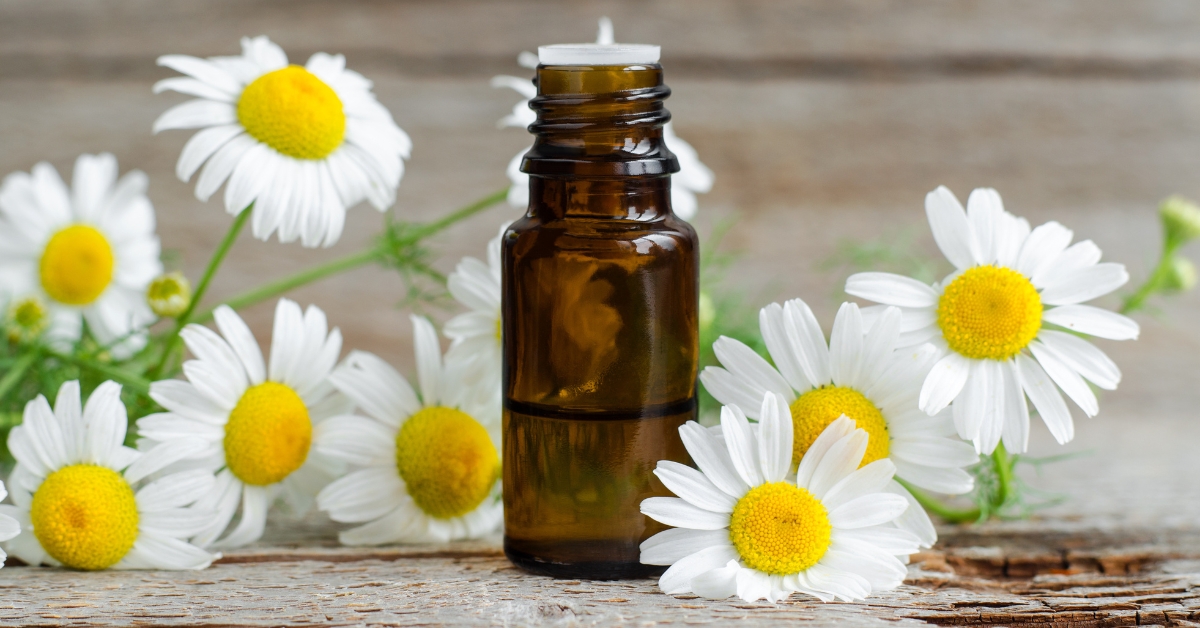
Potent Hemorrhoid Relief Salve
Ingredients:
- 5 drops of chamomile essential oil
- ¼ tablespoon horse chestnut tincture
- ½ tablespoon aloe vera gel
- 1 tablespoon calendula-infused oil
- 1 tablespoon witch hazel extract
- 4 tablespoons unscented base cream
Preparation:
- Mix all liquid ingredients thoroughly.
- Gradually incorporate the base cream until well blended.
- Apply a small amount to the affected area 3-4 times daily.
- Store in an airtight container in the refrigerator and use within 1 week.
These recipes provide a range of options for treating hemorrhoids using herbal remedies. Always consult a healthcare provider before starting any new treatment, especially if you have severe or persistent symptoms.
☯️ Integrating Herbs into Daily Life for Hemorrhoid Relief
Incorporating herbs into your daily routine can help manage hemorrhoid symptoms and promote overall anal health. Here are practical tips for using herbs effectively and complementary practices to maximize their benefits.
Daily Use and Lifestyle Integration
- ☀️ Morning Compress: Start your day with a soothing witch hazel compress. This can help reduce swelling and provide relief before you begin your daily activities. Apply the compress for 5-10 minutes while you prepare for the day.
- 🧴 On-the-Go Gel: Keep a small bottle of the Calming Aloe-Calendula Gel with you for quick relief throughout the day. Apply it after using the restroom to soothe irritation and promote healing. Make sure to clean the area thoroughly before application.
- 🫧 Evening Sitz Bath: End your day with a relaxing herbal sitz bath using the Healing Herbal Sitz Bath mixture. This can help reduce inflammation and promote healing overnight. Soak for 10-15 minutes before bed.
- ♨️ Salve for Severe Symptoms: For more severe symptoms, apply the Potent Hemorrhoid Relief Salve 2-3 times daily, especially after bowel movements and before bed. This provides deeper relief and supports tissue repair.
Additional Practices to Support Anal Health
- 🍓 Dietary Adjustments: Increase your fiber intake by consuming more fruits, vegetables, and whole grains. This helps soften stools and reduces straining during bowel movements. Ensure you drink plenty of water to stay hydrated and promote regular bowel movements, preventing hemorrhoid flare-ups.
- 🏃♀️ Exercise: Engage in moderate exercise, like walking or swimming, to improve circulation and reduce pressure on the anal area. Avoid prolonged sitting, which can exacerbate hemorrhoid symptoms.
- 🚽 Toilet Habits: Don’t strain during bowel movements, and avoid spending excessive time on the toilet. Use soft, unscented toilet paper or moist wipes to clean the area gently, avoiding irritation.
- 🧘♀️ Stress Management: Practice relaxation techniques such as deep breathing or meditation. Stress can contribute to digestive issues, which may worsen hemorrhoid symptoms by increasing tension in the pelvic area.
- 🫖 Herbal Supplements: Horse chestnut or ginkgo supplements may support vascular health and improve circulation. Start with low doses, as recommended on the product, and monitor your body’s response. Discontinue use if any irritation or adverse effects occur, and consult a healthcare provider for guidance.
By integrating these herbal remedies and supportive practices into your daily routine, you can manage hemorrhoid symptoms and promote overall anal health. Remember to start with smaller doses to see how your body reacts, and seek medical advice for persistent or severe symptoms.
🌱 Navigating Herbs Safely
Starting with small doses is the first step when adding herbal remedies to your health routine. This approach lets you see how you respond and adjust amounts for the best effect, keeping safety in mind. While many herbs are safe, everyone’s body reacts differently. If you notice any side effects, it’s important to stop and think about what might be causing them.
Remember, herbs can sometimes interact with prescription medicines. These interactions might make your medicines work too well or not well enough, so talking to a healthcare provider or an herbalist is essential. This is especially crucial if you’re pregnant, breastfeeding, taking medications regularly, or have an existing health condition. Getting advice tailored to your situation can help you avoid any unnecessary risks.
For kids and older adults, being extra careful with herbs is important. Their bodies might react more strongly to herbal remedies, and the chance of side effects or interactions could be greater. Before giving herbal treatments to children or elderly family members, getting advice from a professional is a must to ensure their safety.
By being cautious and seeking expert advice when needed, you can make herbal remedies a safe part of your wellness plan. This careful approach allows you to enjoy the benefits of herbs while keeping yourself and your family safe.
We explored the use of natural herbs for hemorrhoid relief, focusing on five key plants: horse chestnut, witch hazel, aloe vera, calendula, and chamomile. These herbs have been traditionally used to address hemorrhoid symptoms due to their anti-inflammatory, astringent, and soothing properties.
We provided practical herbal recipes ranging from compresses to salves, allowing for customized treatment options. We also offered guidance on integrating these remedies into daily routines, along with complementary lifestyle practices like dietary adjustments and proper toilet habits.
While these herbal remedies show promise in managing hemorrhoid symptoms, it’s important to note that more research is needed to fully establish their efficacy compared to conventional treatments. Always consult a healthcare provider before starting any new treatment, especially for severe or persistent symptoms.
FAQ
What are the most effective herbs for treating hemorrhoids?
The most effective herbs for treating hemorrhoids include horse chestnut, witch hazel, aloe vera, calendula, and chamomile. Horse chestnut contains aescin, which strengthens blood vessels and reduces swelling. Witch hazel is an astringent that helps shrink swollen tissue and temporarily relieves mild bleeding. Aloe vera gel soothes inflammation and promotes healing when applied topically, though it should be patch-tested for sensitivities. Calendula has anti-inflammatory and wound-healing properties that can relieve irritation and support skin repair. Chamomile helps reduce inflammation and calm irritated skin, though people allergic to plants in the Asteraceae family should avoid it. While these herbs may help address pain, swelling, and other symptoms of hemorrhoids, more studies are needed to fully establish their efficacy compared to conventional treatments. Consult a doctor before using herbal remedies, especially if taking other medications.
How do I use herbal treatments for hemorrhoids safely?
To use herbal treatments for hemorrhoids safely, start with topical applications like creams, ointments, or compresses on clean skin. For witch hazel or chamomile, make a compress by steeping the herbs in hot water, straining, and ensuring the liquid has cooled before applying it to the affected area. Use aloe vera gel or calendula cream directly on external hemorrhoids, but patch-test on a less sensitive area first to check for allergic reactions. Take oral supplements like horse chestnut only under medical supervision due to potential drug interactions and risks for those with liver or kidney disease or bleeding disorders. Start with small amounts to test for irritation or allergic reactions, and discontinue use if any adverse effects occur. Do not apply herbal treatments to bleeding hemorrhoids without consulting a doctor first, as persistent bleeding may require more serious medical intervention. While these herbs are generally safe, some people may experience side effects, and those with allergies to plants like chamomile or calendula should avoid these remedies. Pregnant women should be especially cautious and consult their healthcare provider before using any herbal remedies, particularly horse chestnut. Always inform your doctor about any herbal treatments you're using for hemorrhoids, and combine these remedies with lifestyle changes, such as increasing fiber intake and staying hydrated for the best results.
Can herbal treatments completely cure hemorrhoids?
Herbal treatments can provide significant relief from hemorrhoid symptoms, but they may not completely cure the condition in all cases. Herbs like witch hazel and horse chestnut can help reduce swelling, stop mild bleeding, and alleviate pain associated with hemorrhoids. Aloe vera and calendula promote the healing of irritated or damaged tissue. However, these treatments primarily address the symptoms rather than the root causes of hemorrhoids, which are often related to increased pressure in the rectal veins due to factors like constipation, straining, pregnancy, or prolonged sitting. For long-term management and prevention of recurrence, lifestyle changes are essential. This includes maintaining a high-fiber diet, staying hydrated, exercising regularly, and avoiding straining during bowel movements.
In some cases, especially for large or severely prolapsed hemorrhoids, medical procedures such as rubber band ligation or surgery may still be necessary. Herbal treatments are most effective for mild to moderate hemorrhoids and can be an important part of a comprehensive treatment plan. They can help manage symptoms and may reduce the need for more invasive treatments in some patients. Always consult with a healthcare provider for persistent, severe, or recurring hemorrhoids.

